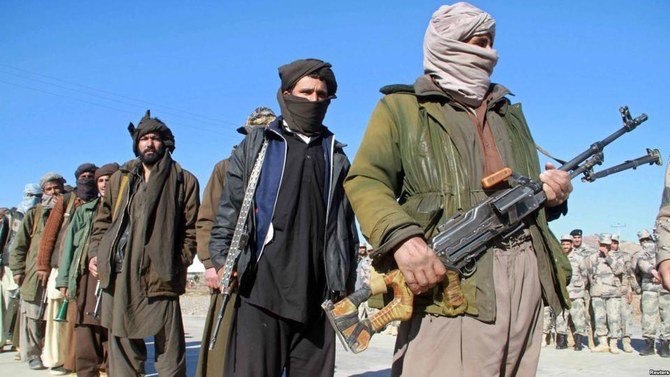Taliban claim control of key Afghan border crossing with Pakistan
Kabul (Reuters) – Taliban fighters in Afghanistan said on Wednesday they have taken control of an important border crossing with Pakistan, the latest trading town they have seized as they make advances after the withdrawal of U.S.-led international forces.
But Afghan officials said government forces pushed back the Taliban fighters and were in control of the Spin Boldak border district in Kandahar province. Civilians in the area said clashes were going on and it was not clear who controlled the border post.
“The mujahideen have captured an important border town called Wesh,” Taliban spokesperson Zabihullah Mujahid said in a statement referring to the border post.
The post is the second most important crossing on the border of landlocked Afghanistan and Pakistan, linking the southern Afghan city of Kandahar to Pakistani ports. Afghan government data shows about 900 trucks cross the frontier there every day.
The Taliban, fighting to expel foreign forces and defeat the U.S.-backed government in Kabul since they were ousted in 2001, have in recent days seized four northern and western border crossings as they capture territory from government forces.
Control of the crossings in Herat and Farah province in the west, Kunduz in the north and, if confirmed, Kandahar in the south would secure for the Taliban a significant stream of revenue, said Shafiqullah Attai, chairman of the Afghanistan Chamber of Commerce and Investment in the capital, Kabul.
“Income has started to go to the Taliban,” Attai told Reuters, though he said he did not have any data on the amount of revenue the insurgents had gained.
President Ashraf Ghani travelled to northern province of Balkh on Tuesday to assess security after the Taliban pushed government forces out of several districts there.
Ghani, 72, met civilians and assured them that “the Taliban’s backbone will be broken” and government forces would soon retake all of the areas lost to the militants, the Tolo News network reported.
Creating Fear
Separately, Vice President Amrullah Saleh said on Twitter that the Taliban were forcing members of a small ethnic minority to either convert to Islam or leave their homes in the northern province of Badakhshan.
Taliban terrorists have expelled dozens of families from Pamirs of Badakhshan telling them either convert to Taliban Islam or leave. These are minority Kerghiz who lived there for centuries & survived hardships & didn't leave. They are now in Tajikistan awaiting fate.
— Amrullah Saleh (@AmrullahSaleh2) July 14, 2021
“These are minority Kerghiz who lived there for centuries … They are now in Tajikistan awaiting their fate,” he said.
A Taliban spokesman was not immediately available for comment but the U.N. mission in Afghanistan said it was increasingly concerned about reports of rights abuses as the fighting spreads.
“The reports of killing, ill-treatment, persecution and discrimination are widespread and disturbing, creating fear and insecurity,” the mission said in a statement.
Taliban spokesmen routinely reject such accusations.
“The best way to end harm to civilians is for peace talks to be re-invigorated in order for a negotiated settlement to be reached,” the U.N. mission said.
The Taliban made a commitment to negotiate with their Afghan rivals as part of an agreement allowing the United States to withdraw its forces but little progress has been made towards a ceasefire in several rounds of talks in Qatar.
Senior politicians from Kabul were preparing to leave for Qatar for more talks this month as Western diplomats urged the rival sides to work towards a power-sharing agreement.



